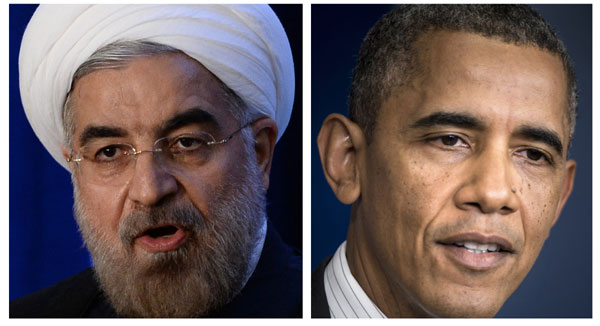Netanyahu promises 'truth' about Teheran
Israeli leader plans to meet with Obama, speak at UN
Israel's prime minister vowed to "expose the truth" about Iran as he headed to Washington on Sunday, after top leaders from the United States and Iran made direct contact for the first time in more than 30 years.
Israeli Prime Minister Benjamin Netanyahu will meet with US President Barack Obama in Washington on Monday and speak at the UN General Assembly in New York on Tuesday.
Quick and concrete diplomatic progress between the United States and Iran is unlikely, analysts said, and divergent attitudes toward Iran between the US and Israel may prove hard to bridge.
"What Iran wants is to be recognized as a nuclear country, but the US will definitely not allow that to happen, which is what prevents the improvement of US-Iran ties from really happening," said Ye Hailin, a researcher on Middle East studies with the Chinese Academy of Social Sciences.
"The US is eager to have a breakthrough in its Middle East policies, because it did not manage to resolve the problems in the region, including the Palestine and Israel issue, Egyptian turmoil and the Syrian issue," he said.
Ye said he does not believe Washington really wants to improve its ties with Iran.
Washington's allies in the Middle East, including Israel, will not allow such improvement, either, he added.
But Jin Canrong, a professor of international affairs at Renmin University of China, said both the US and Iran are willing to improve their relations.
"Washington considers Iran a key issue for its relationship with the Middle East. If the Iran issue can be thoroughly resolved, other problems in the region can be eased," Jin said.
"Washington's sanctions against Iran have harmed the country's economic development, so Teheran hopes to improve relations with Washington and remove those sanctions," he said.
Israel is very sensitive to any possible change in the situation in the Middle East, so will blast Iran at the UN General Assembly, he added.
In a statement, Netanyahu said, "I will represent the citizens of Israel, our national interests, ... our determination to defend ourselves and our hope for peace."
He claimed Iranian President Hassan Rouhani is using a diplomatic approach as a tactic to "fool" the West while Iran continues to enrich uranium in its nuclear program.
"I will tell the truth in the face of the sweettalk and onslaught of smiles. One must talk facts and must tell the truth. ... It is vital for the security and peace of the world and for the security of the State of Israel," Netanyahu said.
Last week, Netanyahu ordered the Israeli delegation to boycott Rouhani's speech at the assembly, calling it "cynical" and "full of hypocrisy".
Last year, a main part of Netanyahu's address to the assembly was dedicated to a warning about a threshold the Iranians may cross on their way to creating nuclear weapons.
Meanwhile, Rouhani got a mixed reception at home after his historic telephone call with Obama.
Iranian newspapers hailed the first contact with a US president in more than three decades as the ending of a long taboo.
Etemaad newspaper carried a front-page photomontage of Rouhani and Obama side by side, with a banner headline reading, "Historic contact on way home."
But Rouhani's 15-minute conversation with the leader of a country long derided in Iran as the "Great Satan" was too much for some hard-liners.
Nearly 60 protestors gathered outside Teheran's Mehrabad Airport on Saturday, chanting "Death to America" and "Death to Israel" as Rouhani's motorcade passed.
A shoe was thrown as Rouhani stood up through the sunroof of his car to acknowledge the crowd. It failed to hit its target.
AFP-Xinhua-China Daily
Zhou Wa in Beijing contributed to this story.
 Iranian President Hassan Rouhani and US President Barack Obama spoke by phone on Friday, in the historic first direct communication between leaders of the two nations since the Islamic revolution in 1979. Emmanuel Dunand (left) and Brendan Smialowski / Agence France-Presse |


















